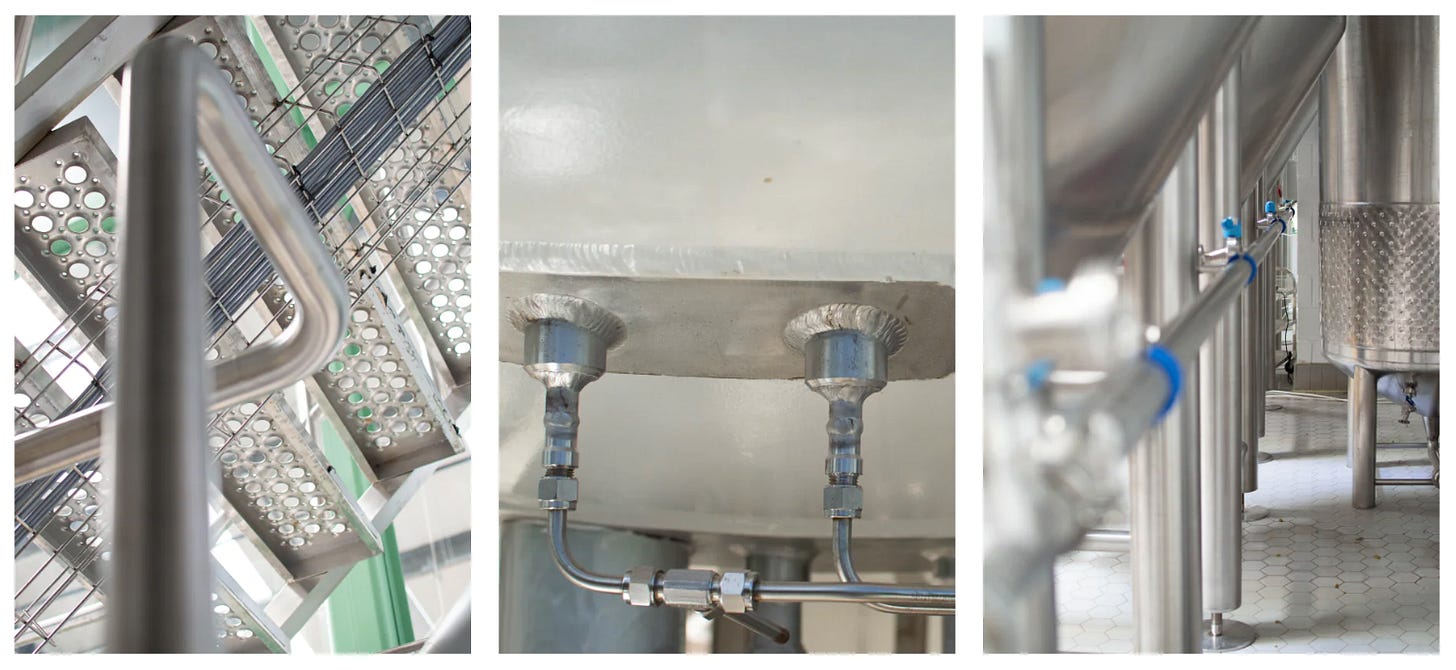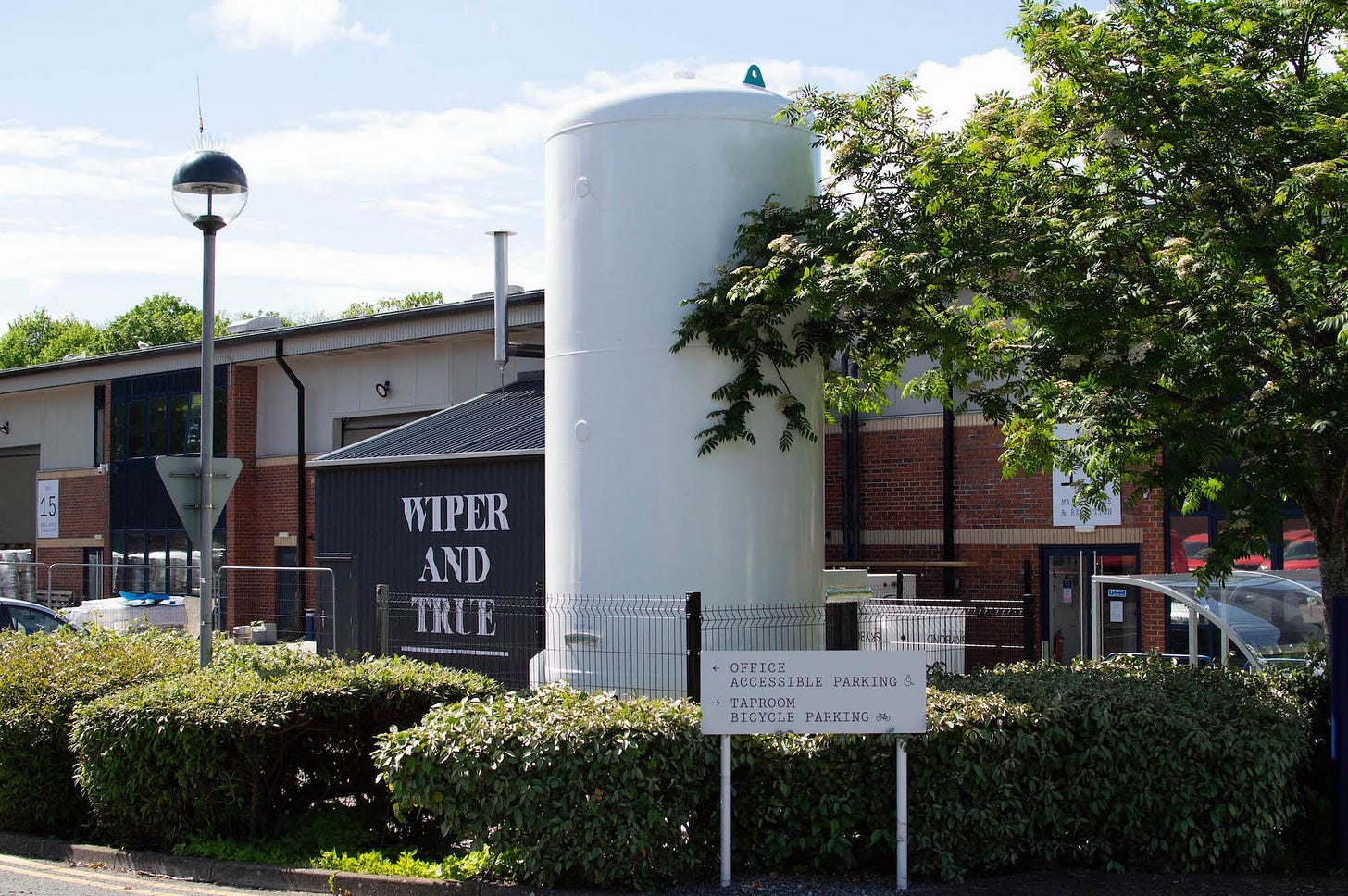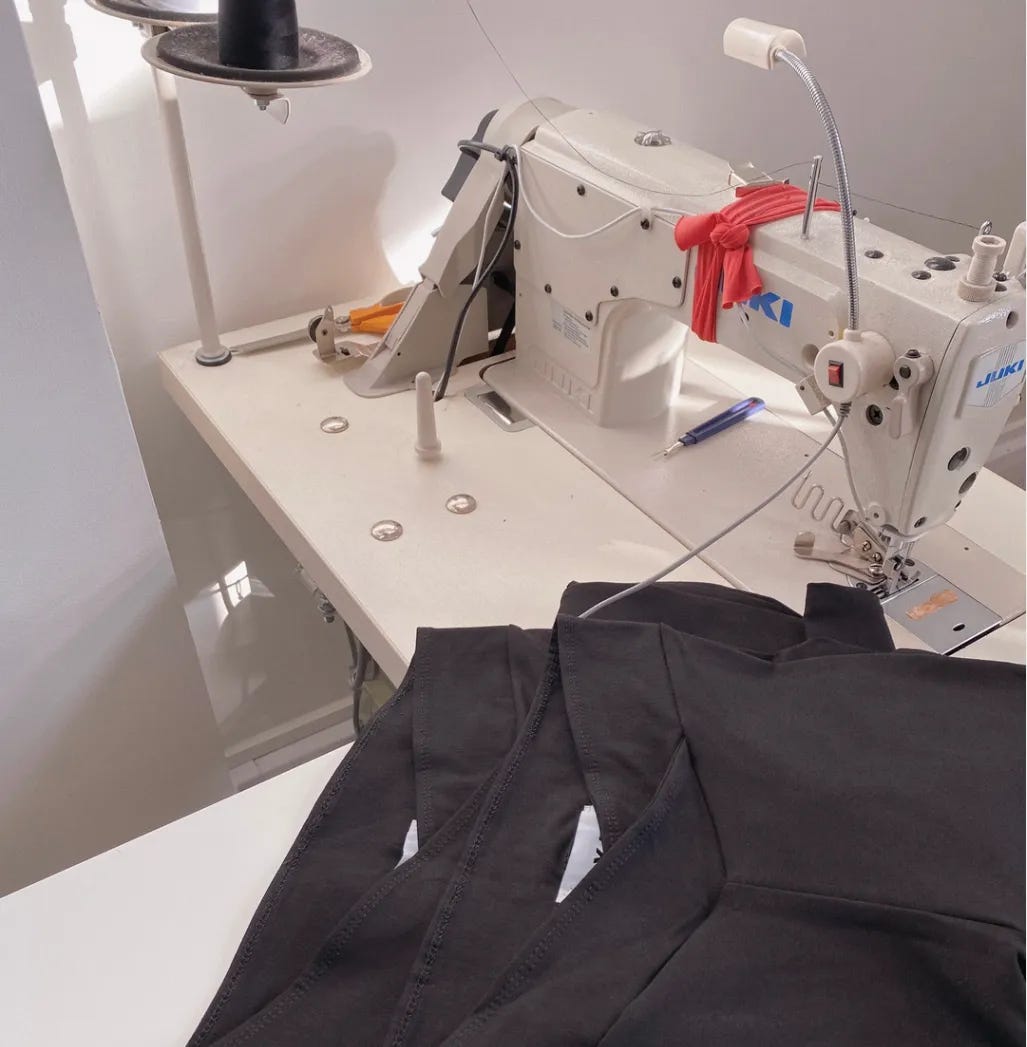🌱 Bubbling Up: The 'Empowering Consumers for the Green Transition' Directive, and Wiper and True's Carbon Capture Tech.
PLUS we're looking for young journalists to help us write our next newsletter!
Happy Monday!
This week we cover:
Quick Take: You Can No Longer Offset Your Way To Carbon Neutrality.
Brand Spotlight: Wiper and True: Closing The Loop With On-site Carbon Capture Technology.
In case you missed it: 🌱 AYM's spin on slow fashion, and your primer on the Green Claims Directive.
It’s also the last week you’ll hear from us in this format… but you’ll have to read on to see what we mean (the suspense, we can’t help it).
> Before we start…
📣 Earth Day 2024: Budding journalists wanted, age 15 or under!
With every issue we hope to inspire and inform people working in sustainability. For Earth Day 2024 we’re going one step further; we want to find the environmental journalists and creative writers of the future to hear what they think and spark in them, and you, a hopeful outlook!
There are two types of submissions we’re looking for from your child / nephew / niece / neighbour / mini-bestie:
Earth Day Spotlight: One journalism style piece about Earth Day - it could be the history of the day, what you’d like the world to look like for Earth Day 2050, or any angle that excites you.
OR
Product of the Future: One creative writing piece describing your ideal futuristic product. The product should solve an environmental problem and it should be something that can be sold at a large supermarket. An example could be pens with ink made from pollution particles. This submission should be accompanied by a drawing of your futuristic item (with labelling if needed).
For both submission options, please write between 350-500 words. All writers must be 15 years or younger on the 22nd April. The more creative the submission the better!
How to submit: All pieces should be submitted here by the 15th of April at 12pm GMT for feedback. Selected submissions will be published in our newsletters or to our 3,500+ followers on LinkedIn throughout the week of the 22nd April. By submitting you give us permission to share your work publicly, and credit you. We will do our best to provide feedback to all pieces submitted. If you have any questions, get in touch via info@followingthefootprints.com.
We can’t wait to read your pieces!
> Good News Last Week
🎯 Vivobarefoot released their latest shoe, The Gobi Sneaker Premium, made from 98% natural materials. The shoes use NFW’s PLIANT™ outsoles which are made from rubber from certified responsibly managed forests and cured with NFW’s plant-based curative.
🎯 Black Cow Vodka partnered with Sustainaholics to launch their Black Cow Alumini, available only on British Airways High Life Café. The mini bottles are packaged in 100% post-consumer recycled aluminium.
🎯 Who Gives A Crap and Heaps Normal have partnered to create a limited-edition non-alcoholic beer, the Cheeky IPA. Who Gives A Crap will donate 50% of the profits along with Heaps Normal’s additional donation of $1.50 for every can of beer sold to non-profit organisations focusing on global clean water and sanitation efforts.
🎯 BOSH! by Henry Firth & Ian Theasby announced they are B Corp certified!
⭐️ Kerry Dairy launched their new Smug range of dairy-oat blended products. All products in the range - cheeses, butter-style products and milks - have smaller carbon footprints than their equivalent dairy products. The products will be available in Tesco, Sainsbury’s, Morrisons and Co-op stores from March.
⚡️ The UK Government announced they will be providing £295 million to local authorities to support them in introducing weekly food waste collections in an effort to reduce food sent to landfills. However, the district councils are not confident that this contribution will be enough to cover the additional costs associated with food waste collections.
> Want good news sooner? We post every Friday on LinkedIn! If your CPG brand has good news to share, let us know.
> Focusing in on
You Can No Longer Offset Your Way To Carbon Neutrality.
Remember back in March 2023 when the EU Parliament proposed the Green Claims Directive to tackle greenwashing? No? Don’t worry - check out our quick guide here. Put simply - it was a game-changer, especially with its proposed ban on “carbon neutral” claims if they’re just based on carbon offsets.
Fast forward to now, 2024, and things have gotten even stricter thanks to the new Empowering Consumers for the Green Transition (ECGT) directive. The EU Parliament voted to outlaw these claims of environmental neutrality, reduced or positive environmental impact (in terms of greenhouse gas emissions) based on offsets in member states was adopted on 26th March 2024 and must be applied by member states by 27th September 2026.
The directive is pretty clear: no labelling your product as “carbon neutral”, “carbon positive”, or “climate net zero” just because you’re offsetting its emissions. Why? Because it's misleading to consumers. These labels give the impression that the product itself has no emissions and so isn’t directly contributing to the climate crisis.
What does this mean for your company?
Carbon Offsets can no longer be used as a quick fix for product emissions. The message sent from the EU directives is crystal clear: prioritise reductions within your product’s supply chain BEFORE turning to external mitigation strategies like carbon offsets. This is in line with SBTi (Science Based Targets initiatives) guidance that states only 5-10% of unavoidable emissions can be offset at net zero, after you’ve done everything possible to reduce them. For many, like us, in this industry - having it in legislation that offsets aren’t your cheap way to an eye-catching marketing strategy is a relief.
If your brand is already acting in accordance with these directives, fantastic! One of the EU’s big goals here is to help customers make informed purchases and to reward truly sustainable brands like yours.
Not there yet? 2026 might seem far off, but it's wise to start thinking about these changes now. Here’s a guide from Linklaters for a deeper dive as to what actions you can take today - especially if you've got products on the market that use 'carbon neutral' labels, or similar ones.
What does this mean for offsets?
It’s not all bad news for carbon offsets. Anna Cavazzini, Chair of the EU Committee on the Internal Market and Consumer Protection, notes that, “investments by companies in climate protection projects are welcome and of course they can still be communicated,” just not in relation to claims of climate neutrality.
Alternate terminology is evolving. South Pole, one of the world’s largest sellers of carbon offsets, suggests that companies purchasing offsets can assert they are “Funding Climate Action”. Meanwhile, the SBTi is advocating for “climate contribution” beyond value chain mitigation claims. This communicates that an organisation has supported climate action outside of their own value chain, contributing to global mitigation efforts.
Regardless of the terminology, additional carbon offsets are a powerful tool to channel funds into climate projects in economically developing countries, often driving additional local benefits beyond global emission reduction - with a particular focus on supporting communities and biodiversity. To us, this directive is another step towards decoupling offsets’ bad reputation due to greenwashing, with the much needed funding they can provide to climate projects around the world. We would still encourage companies to invest in quality carbon offsets, but for the purpose of contributing towards global climate impact initiatives, rather than misleading marketing claims.

👋 Psst - a heads up from us! From next week onwards, we’re splitting this newsletter in half. Here’s the lowdown…
On Mondays we'll suit up and get serious, digging into a topic that is guaranteed to make you look smart at standup (we promise).
On Thursdays we’ll bring you behind the scenes of your favourite brands, and share what the team have loved across the industry that week.
In-between (on LinkedIn, not email) we’ll still be sharing Good News on Fridays, event roundups at the start of the month, webinar summaries for the ones you didn’t quite make and more.
Why? More room to focus on your favourite brands, less chance of content overwhelm at the start of your week, and more opportunities to share what the growing Following the Footprints team are loving and learning.
> Brand Spotlight
Wiper and True: Closing The Loop With On-site Carbon Capture Technology.
Bristol-based brewery, Wiper and True, are on a mission to meet Net Zero by 2030, using innovative tactics to become the most sustainable brewery they can be. The industry-leading tactic that’s caught our eye? Their use of closed loop carbon capture technology, to make use of a natural byproduct in fermentation and an essential ingredient in beer…CO2.
Why carbon capture?
Brewing beer is a process that has played out for thousands of years. A process that wouldn’t be possible without fermentation. This is where yeast eats the sugars in malt and grains to produce alcohol and CO2.
Typically, the CO2 naturally produced in fermentation (used as a key part of the brewing process in carbonating beer) simply bubbles out of fermentation without any use.
This is where Wiper and True saw an opportunity; to make the CO2 produced in fermentation useful in carbonising beer at the end of the process (used to give beer its characteristic fizz). By capturing carbon Wiper and True are saving costs from purchasing CO2, increasing independence from variable carbon costs, reducing transport emissions and reducing the amount of CO2 from entering the atmosphere.
Carbon capture technology for breweries had typically only been available on a large scale, until the Dalum unit, produced in Denmark, downsized the tech. The unit at Wiper and True is only the second to be successfully installed in England - we weren’t joking when we said ‘industry-leading’. The first to install in the UK was Gadd’s, the Ramsgate Brewery in Kent, so naturally, Wiper and True and Gadd’s, produced a cask best bitter to celebrate sustainable brewing in the UK.
So, how does the technology work?
The Dalum unit, referred to as CiCi, works like this;
CO2 is captured from fermenting beer
The gas is washed of impurities and compressed to high pressures
Unwanted gases (oxygen) are condensed out to purify it further
The CO2 is liquified
Liquified CO2 is pumped back into their CO2 cryogenic tank
CO2 is ready for reuse in carbonating beer, purging tanks and in the sterile packaging process
The added benefit of the carbon capture process is that captured CO2 creates a cleaner flavour profile and, therefore, a better tasting beer. Need proof? Last week, Wiper and True’s alcohol-free offerings won Gold and Bronze at the World Alcohol Free Awards, showing they can be both carbon-saving and award-winning on taste.

What does this mean for Wiper and True?
So far this year, Wiper and True have recovered 18602.7kg of CO2 using the Dalum unit, which has capacity to capture roughly 60-70 tonnes of CO2 per year. This allows them to capture CO2 produced as a byproduct of almost every beer they produce.
Notably, however, the overall impact this technology can have on reducing emissions is relatively small, given the small amounts of CO2 released during fermentation. In early testing done at Keswick Brewing Company on the carbon footprint of beer, they found that CO2 released during fermentation only accounts for one-twentieth (15g per pint) of the carbon footprint. Unless breweries use renewable energy, running a CiCi can generate additional emissions from electricity use.
However, Wiper and True identified this and in 2023 installed a 159kW solar array, helping power their brewery and taproom operations. Making strides to become a fully self-sufficient brewery, they achieved 50% self-sufficiency with solar power in a less-than-sunny August last year.
Could you incorporate this approach into your production?
Wiper and True have shown how you can embrace emerging small-scale technologies to save carbon emissions during production, and produce a better tasting beer as a result. Despite the small amount of CO2 produced in fermentation, they have committed to closing the loop on this, reduce carbon emissions, increase their resilience to a volatile CO2 market and, perhaps most importantly, produce a better tasting beer. It’s also a pretty cool and important talking point too.
In what ways could you reduce emissions in your production? Let us know on LinkedIn or reply to this newsletter!
Take a closer look at Wiper and True:
> In case you missed it
🌱 AYM's spin on slow fashion, and your primer on the Green Claims Directive.
Featuring Bold Bean Co, COOK, Sapling Spirits, OGGS and more...
Catching up on the Green Claims Directive that was proposed this time last year, and dig into how AYM are building a business on a ‘pre-order basis’ - being labelled as the ‘antidote to fast fashion’ in the process.
> Follow up with…
Article: Carbon Capture Explainer
Article: Consumer rights: final approval for the directive to empower consumers for the green transition
👉 Pssst - want to be featured in our ‘Meet the Partners’ series? Reach out here!



